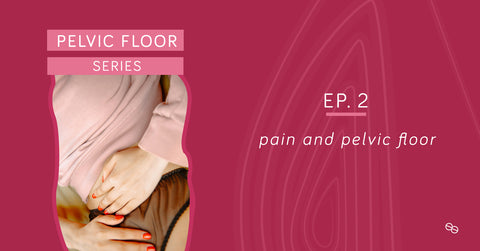Pain and Pelvic Floor; pain is not normal.
Pain is not normal. Ignoring pain is not normal. Pain itself is a symptom, it’s our body’s way to tell us there is something wrong. Pain is a physiologic response. So why are we, womxn, so used to ignoring our pain? Why do we expect to feel it?
Index:
Pain is not normal
Hypertonic pelvic floor gives you pain
Dyspareunia
Vaginal dryness
Vaginismus vulvodynia and pelvic painPeriod pain
Scars and pain
Vaginal atrophy
Take outs episode two
What's the next episode about?

Pain is not normal
The key to really get control over our body is understanding how distorted our way of thinking about pain is. When it comes to intimate pain womxn are so used to ignoring it because we've been told since little girls that pain will be part of our lives.
We expect to experience it with periods, we have seen mothers, sisters, aunties, friends complaining about period cramps. We know our first time will be most probably painful rather than pleasurable. We’ll give birth in pain. Over menopause we’ll most probably have painful sexual intercourse but that’s because at “your age” you shouldn’t probably have sex that much any more.
A ton of bull***ts. Excuse our language.
Pain has been used to control our behaviours, our health, our role in society. There is only one pain that exists for a specific purpose and it is normal: when giving birth. And it’s not some sort of punishment for being laid, but it’s a pain that helps the mother make the right moves to help the baby move through the vaginal canal.
Truth is the way we, and sadly also too many doctors and experts, relate to pain - especially pain at our vulva - is all wrong. Period shouldn't hurt. We don’t just need to relax because we are too nervous or we tend to overthink when penetrative sex is painful. Vaginal dryness is not a symptom to suggest abstinence, it is the result of hormones or an altered pelvic floor tone. The outputs of ages of a patriarchal culture where women’s needs have been ignored and misunderstood are still vivid today.

Hypertonic pelvic floor gives you pain
Let’s re-write the role of pain within our intimate wellness. An altered tone of our pelvic floor is most of the time the reason for experiencing pain at your vulva and it is also something you can get rid of with pelvic floor rehabilitation! So, that’s good news, right? A hypertonic pelvic floor is what gives you pain, even though, since there are many muscles within your pelvic floor, most of the time is a mix of some too tonic muscles and some hypotonic ones.
The pelvic floor area has been ignored for so long; briefly taken in consideration during the 19th century by doctor Kegel and then finally brought back to life today thanks to more funds given to research and more women within the medical community dedicating their knowledge to it. We are not used to feeling our pelvic floor; we don’t know how to “read” the signals it gives us, that’s why many times we experience pain and tend to ignore or cover it with pain killers or the pill (for period pain). Let’s have a look together at the many symptoms/conditions you might have experienced within your intimate/pelvic area, which are linked to your pelvic floor status.

Dyspareunia - painful sex
Have you ever experienced pain at the entrance of the vagina, pain during thrusting, pain only in some positions or in depth during sex? Dyspareunia is the medical term to define discomfort that generates specifically from penetrative sex.
If your pelvic muscles are contracted, they don’t allow the whole pelvic floor system to be flexible and to adapt to something penetrating your vaginal canal. That’s when pain is generated. Since we are talking about a muscular contracture, so something that is not under our control, relaxing and taking a deep breath is not enough. Would you tell a man with a biceps contracture to just relax and it will pass? Don’t think so.
Vaginal Dryness
Is Vaginal dryness linked to Dyspareunia? This is a question we get quite often. When we experience pain during sex a common thought is “I might not be well lubricated”. It’s not wrong, that might be the case. Vaginal Dryness is also linked to a hypertonic pelvic area; if muscles are too rigid, they don’t allow the tissues to be sufficiently supplied by blood and liquids. It can also be generated by some medical treatments or by the pill itself. However, VD and Dyspareunia are two different conditions that might be correlated.
Can lubricants help? Yes lubes are a great help - be sure you choose water based or organic lubricants to avoid irritating the area - but they are not a solution. You can use them to relieve the discomfort if you have vaginal dryness but remember you can get rid of this issue by taking care of your pelvic floor (as well as of dyspareunia).
________________________________________________________________
You may also like: What and Where is your Pelvic Floor? Why you should care.
________________________________________________________________
Vaginismus, Vulvodynia and Pelvic Pain
Three different conditions all linked to too much tone of your pelvic area; vaginismus is generated by a phobia while vulvodynia gives pain, burning sensation, the feeling of having many painful pins.
You can experience vulvodynia even without involving any sexual activity. Sometimes just walking gives you pain or wearing underwear or riding your bike. The strong burning sensation is very common in people suffering from vulvodynia.
Vaginismus per se is the phobia of anything penetrating your vagina, which gives an alert signal to your body that contracts your muscles to “defend” itself. This situation generates pain as well since your pelvic floor is alway way more contracted than it should be. If inserting a tampon or a menstrual cup is painful or you can not even think of touching your vulva in any way, you might be experiencing vaginismus.
On the contrary, pelvic pain is experienced in a much wiser area than your vulva; it usually involves contractions over other muscles rather than just the pelvic floor.

Dysmenorrhea - period pain
Did you know that your vagina and uterus move during your period? Can you feel those movements? Does it hurt or simply gives you a little discomfort as you are not used to feeling them?
Menstruation, blood and periods are still a massive taboo; in almost all cultures and religions menstrual blood is considered dirty. Womxn on their period are impure. Many women are literally disgusted by their menstrual blood and don’t want to touch it. We have been told to ignore everything linked to periods beside getting pregnant, of course. How can we expect to be able to feel or even know our vagina and uterus move during our period?
When we are menstruating there are hormonal changes helping not only the menstruation to happen (the endometrium is released) but also the uterus and vagina to move in order to expel the endometrium.
If again, your pelvic floor is hypertonic, your uterus and vagina will not be able to move smoothly and you’ll experience period cramps. So, believe it or not, your period shouldn’t give you pain. Your super lucky friend who never suffers from period cramps is not just lucky, she is actually just ok.
We should be able to feel those movements and assess if it is just a feeling (like when we can perceive our tongue moving while we are chewing) and therefore learning to get comfortable with it, acknowledging this is happening. If, on the contrary, it is painful, we should try to figure it out why. We shouldn’t consider this normal just because it's common (82% of Anna’s patients suffer from painful periods). We shouldn’t try to get rid of it with painkillers or the pill; let us be clear with that. Painkillers will help you and you should not just rest in pain, but they are not the solution. They just cover the symptom. If pain is generated by a contraction of the pelvic floor and you keep covering it for years, it can give additional pain and issues later on.
Period pain is also one of the most common (and most ignored) symptoms of Endometriosis; that’s why it takes on average 10 years to be diagnosed. You can read our trilogy on this chronic painful disease, but we just want to make clear this is a separate situation from common period pain.
Scars and pelvic pain
I was very surprised when Anna mentioned that even scars not in your pelvic area might be linked to and generate pelvic pain. Muscles in our body are all linked together via what are called muscle bands. Scars are areas where our skin is not as elastic as it was before; many times if the scar is not well done or has not been treated well it might generate adhesions. So even if you had a shoulder surgery, you might experience pain somewhere else in your body, even in your intimate parts.
Before seeing a bit more in depth scars generated by giving birth, let’s consider that piercings or tattoos in your pelvic or vulvar area create scars; radiotherapy might do the same. Scars should not hurt (when totally healed).
C section, episiotomy and any potential scar you might have from giving birth should have been treated correctly; if not, your pelvic pain might be generated by your scar. If that’s the case, even if years have passed, you can relieve the pain seeing a specialist who treats scars and a pelvic floor expert.

Vaginal atrophy
If you have heard this word before, you might have listened to it while discussing post menopause. What is it? It happens when the vaginal and vulvar tissues loose their tone and nourishment. As it happens to our face while ageing, we lose a bit of tone and the texture of our skin changes; the same happens to your vulva. Which are the symptoms? Vaginal dryness, lighter colour of the skin, different texture and pain. You get more delicate and you’ll probably experience pain at your intimate part during sex or touching the area. By working on your pelvic floor you can get rid of the pain and to give your vaginal and vulvar tissue more nourishment and tone.
Take outs episode two
Experiencing pain in your intimate area is a symptom you should not ignore. Culturally, womxn are thought pain will be part of their lives, but we have been told wrong. Most of the time pain at your vulva or vagina is linked to an altered tone of your pelvic floor - hypertone.
Whether it is painful penetration during sex, period pain, vaginismus, vulvodynia, pelvic pain, vaginal dryness, pain from a scar or from vaginal atrophy you can get rid of the pain (or relieve it) with pelvic floor rehabilitation. There is only one pain that is “normal” and physiologic (it exists with a specific purpose); pain when giving birth. Contractions help the woman to move in the right direction to help the baby move into the vaginal canal.
Pain is not shameful. Do not hold on. Do not ignore it. You are not faulty. You can get rid of it. Respect yourself.
What's the next episode about?
In the third episode of Pelvic Floor and Where to Find It Series we’ll discuss vaginal infections and pelvic floor.

